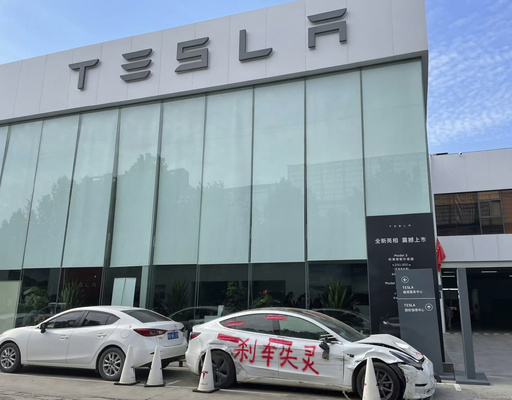BEIJING — A harrowing incident involving Tesla took a surprising turn when Zhang Yazhou, a passenger in her father’s Tesla Model 3, experienced a terrifying crash that left her and her family in shock. Zhang reported hearing her father cry out that the brakes had failed as they approached a red light. In an effort to avoid a collision, he swerved around two vehicles, only to crash into an SUV and a sedan, ultimately hitting a concrete barrier. The aftermath was jarring, with Zhang staring at the deflating airbag in disbelief. To her astonishment, Tesla subsequently sued her for defamation after she spoke publicly about her concerns regarding the vehicle’s brake system, winning the case and forcing her to pay over $23,000 in damages as well as issue a public apology.
Zhang’s experience is not unique. Over the past four years, Tesla, led by Elon Musk, has pursued legal action against multiple car owners in China who reported sudden malfunctions or raised quality complaints, as well as against bloggers and media outlets that criticized the company’s practices. A review of public court records reveals Tesla’s aggressive legal strategy has resulted in victories in all known cases. While Zhang’s case and another are on appeal, Tesla’s dominance in these arenas raises important questions about accountability and consumer rights.
Typically, it is uncommon for car manufacturers to litigate against their customers, but Tesla has adopted a confrontational approach that appears to align with its beneficial connections in the Chinese political landscape. This alignment with influential members of the Communist Party has allowed Tesla to quell dissent and pursue financial advantages while bolstering its reputation. The scrutiny of Tesla’s legal actions comes at a time when Musk has a notable influence on political matters in the U.S., reflecting a problematic interplay between business interests and governance.
The review further highlights Tesla’s legal success in China, pointing out that the automaker has benefited from favorable regulations, below-market loans, and sizable tax incentives. Coverage of Tesla in the Chinese media has generally been supportive, with reports indicating that journalists have been cautioned against publishing negative articles about the brand. This encapsulates the intertwining of government, media, and judiciary structures that operate under the auspices of the ruling Communist Party.
Zhang, infuriated by the crash that sent her family to the hospital — her father suffering a concussion — took matters into her own hands. She sought clarity on the malfunction, hoping to obtain data from Tesla that could provide insights into her situation. However, her repeated requests for information were met with refusal. Angered by Tesla’s dismissive treatment, she embarked on protests, utilizing banners and bullhorns to vocalize her frustrations publicly. Despite her efforts, mediation yielded no resolution, compelling her to make her way to an auto show in Shanghai to confront Tesla executives directly.
Disregarding the barriers, Zhang and a friend attended the event with bold statements emblazoned on their shirts. As their cries of “Brakes fail!” echoed through the exhibit, the situation escalated quickly, culminating in Zhang’s detainment for five days. Speculation arose concerning the motives behind her demonstration, with Tesla suggesting a conspiracy behind her actions. Zhang, however, remained adamant that her protests stemmed from personal grief and justifiable anger rather than a desire for financial gain.
Zhang’s subsequent legal battles against Tesla reached an unexpected crossroads. While she initially pursued a defamation case in response to disparaging remarks made by an executive, she became the target of Tesla’s own defamation suit. Tesla accused her of spreading misinformation that harmed their brand image, seeking significant damages in court. As her lawsuit unfolded in a climate of rising criticism towards Tesla, the court ruled against her claims of brake malfunction, accepting Tesla’s explanations that emphasized her father’s driving speed and the vehicle’s braking performance.
Despite Tesla eventually releasing the pre-crash data, Zhang felt unsettled by the revelation, suspecting potential tampering and enduring online harassment as a result. Frustrated, she initiated yet another lawsuit alleging a breach of privacy, which also resulted in a defeat in court. Ultimately, the federal court in Shanghai ruled against Zhang, compelling her to issue an apology and to pay substantial damages to Tesla, which she vehemently contests.
Zhang’s story highlights the significant legal hurdles consumers face when challenging powerful corporations like Tesla, particularly in an environment where the courts favor such entities. A review reveals that Tesla has a staggering win rate in legal disputes against consumers. Observers have expressed concerns about the implications for those seeking justice against perceived corporate missteps.
The relationship between Tesla and Chinese political forces has been instrumental in shaping the automaker’s pathway through regulatory landscapes, as Tesla emerged as a key player in the nation’s electric vehicle sector. While the company has amassed a loyal customer base and profited from governmental support, the pressure on automotive consumers has intensified as the brand has demonstrated a willingness to leverage its legal power against dissenting voices.
Continuing concerns remain about the broader implications of Tesla’s aggressive litigation strategies, both in China and the United States. While Tesla has yet to adopt similar tactics with its U.S. customers, the cautionary tales emerging from China may influence future corporate behavior across markets. The fear instilled in dissenters underscores a potential chilling effect on transparency in the automotive industry, where customer experiences could be stifled through potential retribution for speaking out. This situation leaves one contemplating the balance between corporate reputation and consumer rights in an increasingly competitive and scrutinizing environment.




